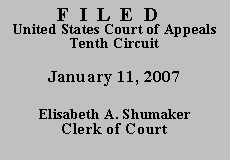

|
UNITED STATES OF AMERICA, |
(D.C. Nos. 1:05-CV-142-PGC and 1:00-CR-51-PGC) |
Before MURPHY, SEYMOUR, and McCONNELL, Circuit Judges.
A jury found Cooper guilty of bank robbery, in violation of 18 U.S.C. § 2113, and using a firearm during the commission of a crime of violence, in violation of 18 U.S.C. § 924(c)(1)(A)(ii). Applying the "three strikes" provision set out in 18 U.S.C. § 3559(c)(1), the district court sentenced Cooper to life imprisonment on the bank robbery conviction and a consecutive seven-year term of imprisonment on the firearm conviction. Cooper's convictions and sentences were affirmed by this court on direct appeal. United States v. Cooper, 375 F.3d 1041, 1054 (10th Cir. 2004).
Cooper filed the instant § 2255 motion on November 18, 2005, raising six claims: (1) the sentence imposed for the bank robbery conviction exceeded the statutory maximum set out in 18 U.S.C. § 2113(a) and the district court failed to state in open court the rationale for imposing the life sentence; (2) the trial court incorrectly calculated his offense level under the United States Sentencing Guidelines; (3) his Sixth Amendment rights were violated by the application of the § 3559(c)(1) enhancement because the judge found facts relating to whether his prior felony convictions were part of a common scheme or plan; (4) his Fifth and Sixth Amendment rights were violated because the issue of the existence of his prior felony convictions was not presented to a jury; and (5) his appellate counsel was ineffective for failing to raise claims on direct appeal, failing to object to the Presentence Investigation Report, and failing to properly present arguments to this court on direct appeal. The district court considered each of Cooper's arguments in turn and denied relief. In so ruling, the court noted, inter alia, that (1) Cooper was sentenced pursuant to statute, not the Sentencing Guidelines, his sentence did not exceed the statutory maximum, and at sentencing the court stated the guidelines sentence was "superseded by the mandatory life sentence by statute"; (2) even if the Presentence Report improperly failed to consolidate certain prior felonies, Cooper had at least five different serious violent felony convictions that triggered the application of 18 U.S.C. § 3559(c)(1); (3) Cooper's other claims relating to his sentencing were barred by Almendarez-Torres v. United States, 523 U.S. 224, 228 (1998) and United States v. Bellamy, 411 F.3d 1182, 1188 (10th Cir. 2005); and (4) Cooper failed to demonstrate he was prejudiced by his counsel's alleged ineffective assistance.
To be entitled to a COA, Cooper must make "a substantial showing of the denial of a constitutional right." 28 U.S.C. § 2253(c)(2). To make the requisite showing, he must demonstrate "that reasonable jurists could debate whether (or, for that matter, agree that) the petition should have been resolved in a different manner or that the issues presented were adequate to deserve encouragement to proceed further." Miller-El v. Cockrell, 537 U.S. 322, 336 (2003) (quotations omitted); see also Slack v. McDaniel, 529 U.S. 474, 484-85 (2000) (holding that when a district court dismisses a habeas petition on procedural grounds, a petitioner is entitled to a COA only if he shows both that reasonable jurists would find it debatable whether he had stated a valid constitutional claim and debatable whether the district court's procedural ruling was correct). In evaluating whether Cooper has satisfied his burden, this court undertakes "a preliminary, though not definitive, consideration of the [legal] framework" applicable to each of his claims. Miller-El at 338. Although Cooper need not demonstrate his appeal will succeed to be entitled to a COA, he must "prove something more than the absence of frivolity or the existence of mere good faith." Id.
Having undertaken a review of Cooper's application for a COA and appellate filings, the district court's order, and the entire record on appeal pursuant to the framework set out by the Supreme Court in Miller-El, this court concludes Cooper is not entitled to a COA. The district court's resolution of Cooper's § 2255 motion is not reasonably subject to debate and the issues he seeks to raise on appeal are not adequate to deserve further proceedings. Accordingly, this court denies Cooper's request for a COA and dismisses this appeal.
Entered for the Court
ELISABETH A. SHUMAKER, Clerk
By
Deputy Clerk